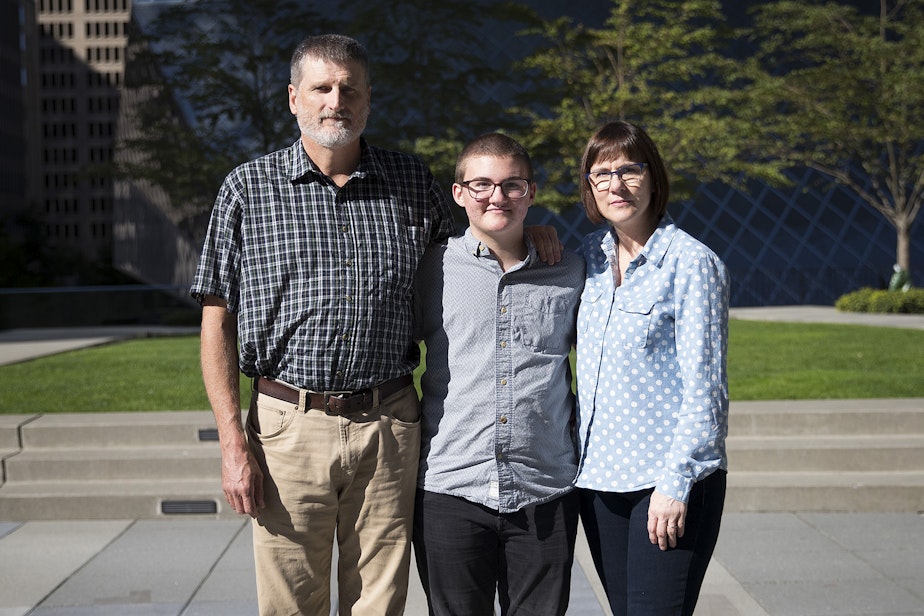Employer wouldn't cover their transgender son's surgery. Now ACLU is suing

Paxton Enstad is 17 years old and loves to swim. He has many passions – art, baking, gingerbread sculpting – but he always loved to swim.
“When I was little I loved swimming. I would swim with my sister and my friends,” he said. “And then after puberty started I just completely stopped.”
He stopped because Pax Enstad is transgender and the body he was born with – a female body – was at odds with his gender identity.
Throughout middle school he felt disconnected from his body. He struggled with anxiety and depression. His grades started to fall and he began to spend all of his time in his room.
“Then I discovered that I could bind my chest and that really helped. But it only helped so much,” he said.
Sponsored
His doctor prescribed chest reconstructive surgery to help align his physical body with his gender identity. But when they tried to move ahead with it, the Enstad family hit a road block.
Cheryl Enstad, Pax Enstad’s mother, worked for PeaceHealth, a Catholic healthcare organization, for more than 20 years. She got a health benefits plan through work, but her workplace refused to cover her son’s surgery.
In a civil rights lawsuit filed by the ACLU of Washington in federal court Thursday, attorneys for Cheryl and Pax Enstad claim that PeaceHealth cited a policy of excluding all “transgender services.”
The state's insurance commissioner's office requires that insurers don't discriminate in coverage of medically necessary procedures. PeaceHealth's health insurance plan is self-funded, and therefore not regulated by the Washington state insurance commissioner's office.
But the lawsuit contends that refusing to cover medical care required by transgender people is illegal.
Sponsored
“Under state and federal law, no company is allowed to single out and exclude one group of individuals from medical care that is prescribed for them by their doctors and that the company routinely provides for others,” ACLU-WA staff attorney Lisa Nowlin said in a statement.
In a statement, PeaceHealth said they’re unable to comment on pending litigation.
“PeaceHealth is committed to creating an inclusive health care environment. Throughout our 126-year heritage, we have been dedicated to embracing and celebrating the diversity of our communities, our caregivers and the individuals we are privileged to serve. We remain committed to promoting personal and community health, and treating each person in a loving and caring way.”
For Cheryl Enstad, it was a huge blow to find out her health benefits through work wouldn’t cover the surgery. She said it had been a long road to find an appropriate solution for her son.
"To have the PeaceHealth insurance be the barrier was just very upsetting because to us it was kind of life and death. I mean, Pax really got to the point where he just was really not functioning,” she said.
Sponsored
The lawsuit notes that in the past, some public and private insurance companies excluded coverage for surgeries for transgender individuals “based on the erroneous assumption that such treatments were cosmetic or experimental. Today, however, every major medical organization recognizes that such exclusions have no basis in medical science and that transition-related care is effective, safe, and medically necessary when clinically indicated.”
Cheryl Enstad said her son described his chest like tumors growing. And despite the response from her employer, the family decided to go ahead with the surgery anyway.
“We just really felt like it was essential to Pax,” said Mark Enstad, Pax Enstad’s father. “We’re very fortunate to own a home and be able to take out a second mortgage… it didn’t matter what it took, we were going to do that.”
The family also dipped into college savings to pay for the surgery.
For Pax Enstad, the results were immediate.
Sponsored
“This surgery really helped me feel comfortable in my own body… I just felt a lot better and more free after,” he said. “After surgery, I’ve been swimming. And it’s been really fun and it’s nice to be outside more and just feel like that’s something I can do.”
“It’s really cool to see him come downstairs with no shirt on and just be comfortable. It’s just an amazing thing, it’s been a real blessing for our family,” Mark Enstad said.
Pax Enstad said he hopes the lawsuit gets PeaceHealth to change their policies and prompts a national conversation about transgender health care and transgender rights.
“There are a lot of people who wouldn’t be able to do what we did without insurance, and it’s just such a life-saving thing that I think it’s really necessary,” Pax Enstad said.
According to a report by the National Center for Transgender Equality and the National Gay and Lesbian Task Force, nearly 30 percent of transgender survey respondents postponed health care because of discrimination. Discrimination contributes to high risk of suicide in the transgender community.
Sponsored
Pax Enstad said health care is a major issue for transgender people, but it’s not the only one. He wants to see more movement on transgender rights across the board.
